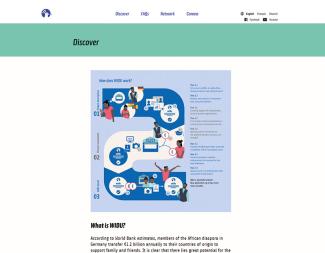Business support
“There is no shortage of ideas, just a shortage of money”

Germany’s Federal Ministry for Economic Cooperation and Development (BMZ), together with the German Agency for International Cooperation (GIZ), developed the platform WIDU.africa with input from the diaspora from the very beginning, praises Hervé Tcheumeleu, the director of the Berlin cultural association “Afrika Medien Zentrum”. He himself has already benefited from the platform, he says. “My aunt in Cameroon wanted to sell ice cream and needed about € 1000 for a stand. But she didn’t have that much money.” He donated € 250 and she had to contribute another € 250. The rest was paid for by the German government.
Their experience illustrates the concept behind WIDU.africa. The African businesses that receive funding must contribute the same amount of money as their supporters in the diaspora. That aspect is important to the project leaders because it ensures that the partnership proceeds on equal footing. “Investing the same amount makes the partners equal,” claims the WIDU platform. At the moment, only businesses in Ghana and Cameroon are receiving donations. The partner in the diaspora pays a fourth and the entrepreneur likewise. The German government then matches the sum of their contributions. The maximum funding amount is € 5000, so state contributions are capped at € 2500 per project.
The platform has been online since the end of 2019. According to the WIDU programme director, Wolfram Zunzer of GIZ, over 2,000 projects have since been registered, of which around 650 are already being implemented in Ghana and Cameroon. Three million euros of private and public funding have thus been mobilised. The pilot phase was concluded in May 2020, and the project is now being launched in other African countries. Kenya, Togo and Ethiopia will be added this year, and further countries will be added in 2021.
What makes this platform unique is that it supports entrepreneurs in the informal sector, who constitute up to 90 % of the labour market in most sub-Saharan African countries. Zunzer expects that by the end of the project’s duration at the end of next year, over 6,000 jobs will have been created and over € 8 million will have been mobilised.
The entrepreneurs who receive funding from WIDU do not simply receive money from Germany, however; they also receive individual business coaching on site, provided by local coaching organisations.
Tcheumeleu believes in the concept behind WIDU.africa: his association, along with other diaspora organisations, also helped develop the platform. As a result, he says, the needs of the people in question were truly taken into account. He believes that WIDU.africa represents a new approach to development cooperation and creates sustainable businesses. These businesses are not being created by relatives and friends in the diaspora, he continues, but rather by the local entrepreneurs themselves. He thinks that is a good thing, “because in Africa, there is no shortage of ideas, just a shortage of money.” That’s where the diaspora can step in.
The digital approach makes it possible to react quickly. For example, shortly after the outbreak of the coronavirus pandemic in March 2020, WIDU started an additional funding programme. Its support targets the small businesses whose activities contribute to overcoming the crisis. The coaching process was adapted to also be able to function during times of lockdown and issue payments on time. There has been considerable demand for these services: 160 projects are currently underway.
Existing projects have received coronavirus aid as well: on top of the regular WIDU grants, each business was awarded an additional € 250. The people affected can use that money to cover their costs of living or ongoing business expenses, to adhere to hygiene measures or to protect their livelihoods during the crisis.
Link
WIDU.africa:
https://widu.africa/








